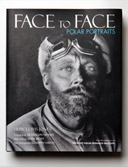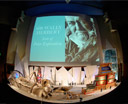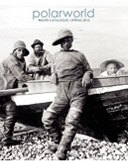 Our ProductsOur Resources |
This website requires the free Flash plugin to be installed.
Polarworld - discover more polar booksThe Arctic Book Review Franklin's Passage Franklin's PassageDavid Solway Reviewed by Russell A. Potter The tragic final expedition of Sir John Franklin, as often noted in these pages, has served as the inspiration for numerous works of fiction, among them novels by Sten Nadolny, Robert Edric, and William T. Vollmann. What is less well-known is that is has also been the occasion for an even greater number of poems, most (but not all) elegiac in theme, from the very moment of Franklin's disappearance to the present. Some, like C.H. Abrahall's Arctic Enterprise (1856) or Gerald St. Maur's Odyssey Northwest (1983), were epic in scope and length, while others, such as Swinburne's philosophical elegy "The Death of Sir John Franklin” or R.W. Dixon's "Sir John Franklin" (both 1860), were more lyrical in their tone. Perhaps the best known of all these is Gwendolyn MacEwen's "Terror and Erebus" (1965), originally written as a radio presentation for the CBC, and later published in Afterworlds. MacEwen's bleakly beautiful images of the "cold holiness of snow," amidst which wandering Arctic explorer-monks drop, one by one, amidst the "crushed, complex geography of men," are certainly the most compelling to modern readers. MacEwen's poem is almost to Canada what Eliot's "The Waste Land" is to Britain. Solway is aware of these footsteps in which he treads, and indeed begins with quotes from MacEwen, Thoreau, Elizabeth Bishop, and the traditional "Lady Franklin's Lament" – and yet it's clear from the beginning that his project is something more exuberant, though not necessarily less poignant, than theirs. Solway takes the Franklin saga from the modern to the postmodern, happily chewing up Franklin books, web pages, search reports, and photographs, weaving their fragments into a gleefully unshored ruin. His may be the first poetic cycle of its kind to take up such a diverse range of source materials, and nothing Franklin is alien to him: we have Dave Woodman's "Mission to Utjulik" web page (with pithy epitomes of his expedition's magnetometers), Nadolny's ode to slowness, the garbled seaman's argot of the "Peglar Papers," and Jeffrey Blair Latta's conspiracy-strewn strands of the Franklin 'lunatic fringe.' Even the detritus of web-browsing, such as an electronic receipt of Solway's abebooks.com order for Latta's book, is potential fodder for the poetical mill. In less capable hands, such a playful pastiche of Arctic book-and-internet-browsing might be a mere jumble, but Solway shows a remarkable knack for drawing elegiac tones from his frozen scrap-heap. He teases us into realizing what we, in our own technologically-assisted search for the fabled Lost Expedition, have already done: we have made our own, unnoticed epic, heaped up our own (virtual) stack of cans, and yet -- like Thoreau's Grinnell -- we still have no idea where we ourselves may be. Picking through these discarded materials, he traces our own aimless wanderings, probing the higher latitudes of our own, peculiarly twenty-first century, sense of alienation. The attraction of a figure such as Franklin, the very epitome of a bygone notion of noble failure, to us today, lost in a realm where the finger-posts point every which way, has never yet been so perfectly framed. In between and among these frosted flakes of our postmodern condition, Solway weaves his own voice, at time ironic, at times rueful, always lyrical. At its best, this voice takes on an almost Blakean purity of line, as with a series of quatrains facetiously attributed to "John Franklin, circa 2003": We trace identical descent, the astronaut, the diver and the explorer in his tent, by land or sky or river . . . whether peasant-born or gentry, the sailor or the marcher, whether burning on re-entry or freezing at departure. At times, Solway's lyricism seems closely kindred to MacEwen's, speaking of skulls "with holes bored / into the intimate slope of bone"; at other moments, he quite avidly pokes fun at our sense of poignancy, striking up a mock-epic quadrameter with fool's bells: "Sing them a ballad and tender their names: Francis, Cornelius, Edmund, and James ... Charles and Robert and Henry and George, To be martyred and purged in the wintry forge. Yet throughout these pages, Solway remains a steadfast, if ironical guide, quipping over our shoulder as we surf the 'Net, sitting next to us on our living-room couches as we watch Arctic documentaries on television: A creature divided, I flip the channels effortlessly – The breach not yet absolute – collapsing distance into near-simultaneity as I move from ice surface to ice surface, achieving perfect passage from one world to another keeping the story going. This playing upon passage – a word so momentous in its geographical sweep, so small as it marks our own passage through the seemingly endless trivia of our daily lives – lies at the heart of Solway's accomplishment. More than any other contemporary poet I know, Solway has mastered the art of leaping from the mundane to the sublime, always in such a way that we are startled into a realization of strangeness, of the uncanny bargain we have made with reality, whether in its material or "virtual" forms. Solway's book, which recently became the first Anglophone work ever to be awarded the prestigious Grand Prix du Livre de Montréal, stands almost alone in the contemporary poetic wilderness – evidence that lyricism and irony need not, even if they are stranded together in a frozen whaleboat at 74 degrees north latitude, eat one another. It is also, to my mind, the most elegant and encompassing précis of the Franklin fascination yet written. |
|
||
follow us  | join us | join us  | home | contact | home | contact
|
||||
|
© Copyright Polarworld Ltd
SiteWizard.co.uk Web Site Design Company |
||||


